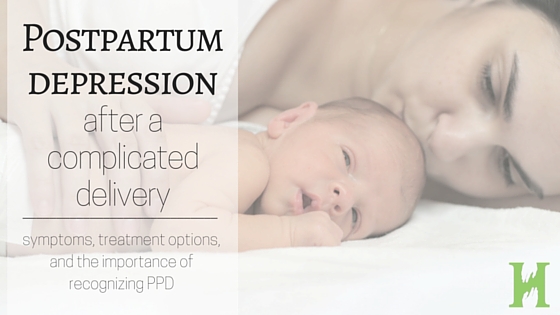The following post is the second part of a three-part series on PPD and PTSD in NICU parents. Visit part 1 of the series: Postpartum Depression and PTSD in Fathers, and stay tuned for Part 3 in August!

We have heard more and more in the news about how common postpartum depression is – affecting about 15-20% of mothers. But many women ask me what could put them at risk for developing postpartum depression.
There are several factors that put women at risk for PPD. One such factor is a complicated or traumatic delivery and having an infant in the neonatal intensive care unit (NICU). There are other factors as well, such as a history of depression, a family history, and poor social support, but this article will focus specifically on the mental health consequences of a complicated delivery and a neonate in the NICU.
The trend in the US has been increasing numbers of admission of infants to NICUs. Since the first neonatal ICU was established in 1960, infant mortality has significantly dropped and more babies that may not have been able to survive are doing well. This also means that more families are exposed to the experience of an infant in this stressful environment, and they try to manage the emotions and psychological difficulties of having a premature or ill baby.
The Emotions of NICU Parents
Having an infant in the NICU comes with its own set of complications and emotions. Many women describe feeling guilty or like “a failure” when the pregnancy or labor did not go smoothly. That guilt can become overpowering and is a key symptom of postpartum depression.
Others describe feeling very stressed, especially if there are other children at home or other responsibilities, making it so that a parent feels torn between two worlds.
There are feelings of helplessness, because it is so different to care for a neonate in the NICU. There is often a lot of medical information to process and the anxiety of separation from the baby.
For these reasons, mothers of preterm babies are 40% more likely to develop postpartum depression, and those with neonates in the NICU have a 28-70% risk of postpartum depression. The risk of postpartum depression can persist throughout the entire first year postpartum. There is also an increased risk of postpartum Post-traumatic stress disorder, and sometimes moms experience both postpartum depression and postpartum PTSD.
Importance of Recognizing Postpartum Depression
Postpartum depression affects the wellbeing of mom, and it also affects the development of the baby and the relationship between mom and baby. A mom who is struggling with postpartum depression may find it harder to visit her baby in the NICU and to feel bonded and attached.
Infants with depressed mothers have been shown to have differences in their cognitive, behavioral, and emotional development. Because babies who required a NICU stay are already at potential risk of some of these complications, it is important to decrease any other risks, such as by treating postpartum depression in mom.
Symptoms of Postpartum Depression
The symptoms of postpartum depression include:
- Feeling down, depressed for most of the day; for some women, it can be extreme anxiety and for others a feeling of numbness or irritability.
- Losing pleasure in previously enjoyable things; this might include distancing yourself from your baby or your partner.
- Changes in sleep, appetite, and energy. Are you not able to sleep at night even when your baby is asleep? Are you forcing yourself to eat? Is your energy level lower than what you might expect as a new mom?
- Trouble with focus and concentration
- Significant feelings of guilt or worthlessness
- Thoughts of hopelessness or suicide
- Restlessness or, alternatively, a decrease in movement
Treatment for Postpartum Depression
Treatment can include medications (and there are safe options, even for breastfeeding moms), different types of individual and group psychotherapy, and self-care including massage, acupuncture, and more. It can also be really helpful to connect with other mothers going through the same experiences. While not always easy to do, it is also important to ask for help and support from family or friends.
I recommend speaking with your obstetrician or primary care doctor, the NICU social worker, or your baby’s pediatrician to begin the process of healing.
 About Dr. Glezer:
About Dr. Glezer:
Anna Glezer, MD is a Harvard-trained clinician with current joint appointments in the reproductive psychiatry and OB/GYN departments at UCSF Medical Center. She is the founder of Mind Body Pregnancy, a new online educational resource that helps women with their emotional well-being and mental health during pregnancy, delivery, and postpartum.
